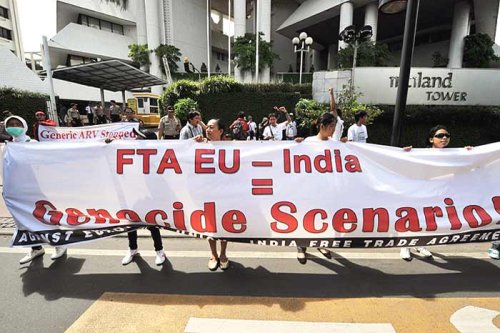
The Guardian | 23 February 2017
Brexit could help EU strike free trade deal with India, MEPs believe
by Daniel Boffey
The EU believes it may stand a better chance of striking a free trade deal with India after the UK leaves the union, despite the importance Britain attaches to trade with its old colony.
A document drawn up by MEPs on the powerful trade committee analysing the impact of Brexit on the EU’s trade talks around the world suggests India’s desire to maintain tariffs on scotch whisky has hindered progress on a EU-India deal.
Theresa May’s opposition to India being given plentiful visa opportunities for its skilled workers in the UK has also been a hurdle in previous trade talks.
The MEPs say Brexit may offer an opportunity for the EU, which is a much more important market for Indian companies, despite the UK’s belief in its special link with the country. “Given the important Indian diaspora living in the UK and the common past, the UK tends to attach particular importance to its economic relations to India, however, trading ties are more important with other EU member states,” they write.
“As a trading partner for India, Germany is the top EU country (rank number six), whereby the UK figures only rank 18 between Kuwait and Iran as a trading partner for India. While the UK makes up 3.4% of India’s overall exports, it accounts only for less than 2% of India’s exports. In addition currently the UK has by far the largest trade deficit in goods with India of any EU member states accounting for €2,611m (whereby Belgium and Germany have a large trade surplus with India).”
The MEPs say the UK’s withdrawal provides a chance for the EU to build on the better trade links with India, and they suggest May’s government will struggle to strike the deal it wants. They say: “Scotland has a major interest in an FTA [free trade agreeement] with India: India has the world’s largest market for whisky, which is highly protected by prohibitive tariffs. Lowering tariffs for Scottish whisky could present an important market opportunity.
“In case the UK (including Scotland) would leave the EU, this could possibly facilitate FTA negotiations [for the EU] as tariffs on wines and spirits constitute an obstacle. This as well as financial services, would then become a bit less of an offensive interest of the EU.”
The document adds that the visas India has been seeking for its skilled workers is a “political problem” for the UK if it wants a deal: “India has a major interest in mode IV access for its service suppliers to the UK, which would also prove politically difficult (as most of the Indian service providers would certainly like to enter the UK for delivering temporary services).”
Last November, the British prime minister visited India seeking to “reboot” the relationship between the two countries, describing them as natural partners, but met resistance from the Indian government. A spokesman for India’s minister of external affairs suggested a policy brought in by May as home secretary, which restricted the right of Indian students to stay in the UK after graduation, could prove to be a block on progress.
Shashi Tharoor, the chairman of India’s parliamentary standing committee on external affairs, suggested May’s refusal as home secretary to allow greater access to the UK for skilled Indian workers, in particular, had “screwed up” chances of an EU-India trade deal and would prove to be “detrimental” to future relations.
The MEPs’ document, leaked to the Guardian, does however see a threat to the EU’s other trade talks in Britain’s withdrawal.
In particular, there are concerns that the negotiations with Australia and New Zealand due to start in mid-2017 could be scuppered. The MEPs say it is likely the Australians and New Zealanders will seek a swift deal with Britain post-Brexit which could impede any EU aspirations. “Reduction in size of the EU could lower the attractiveness of the ensuing FTA negotiations from the perspective of negotiating partners in Australia and New Zealand, gaining access to a smaller market”, the MEPs write.
“The two partners are likely to immediately seek to conclude bilateral free trade deals with the UK after its departure from the EU.
“A process of ‘parallel consultations’ could complicate the negotiations. The UK’s close ties to Australia and New Zealand mean it has been a key voice for concluding timely ambitious FTAs with the two partners and would have been an important contributor to EU comprehensive trade talks.”